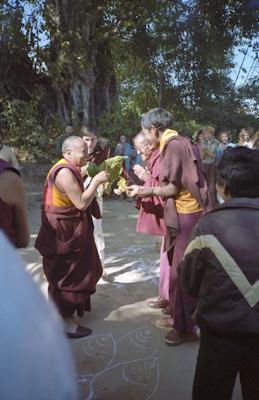The transcripts were extensively edited to eliminate repetitions and to present the teachings in reasonably fluid English according to Lama Zopa Rinpoche’s instructions. However, I attempted not to lose the characteristic qualities of the lamas’ method of presentation entirely.
Due to incorrect hearing and interpretation there are without doubt many errors of meaning and the responsibility for these is borne solely by the editor. It is hoped that this book will bring inspiration and a deeper understanding of the Dharma to those who were unable to attend the course and those of us fortunate enough to share that month on Kopan Hill.
Finally, I wish to thank the many kind people, too numerous to mention, for their dedicated work of transcribing the manuscripts and for their suggestions and encouragement.
The merits created through the effort that has gone into this publication are dedicated for the long lives of Lama Zopa Rinpoche, Tenzin Ösel Hita, His Holiness the Dalai Lama and all Dharma gurus, their students and for the flourishing of all centers of study and practice. May every living being rapidly attain the sorrowless state.
Uldis Balodis
Den Nyi Ling retreat centre
Drusti, Latvia
July 2020
Introduction
Volume 3 of The Enlightened Experience features three discourses given by Lama Yeshe at the Sixteenth Kopan Meditation Course held at Kopan Monastery, Nepal, in November–December 1983. Lama Yeshe had arrived at Kopan just before the end of the meditation course and although he was very ill, he gave these teachings, along with a refuge ceremony and the bodhisattva vows.
In Big Love: The Life and Teachings of Lama Yeshe, author Adele Hulse writes: “The students were pretty tense after a month of contemplating their own negative minds, but after just a few words from Lama they began to glow with delight.” These were Lama’s last public teachings before his health suddenly deteriorated and he was rushed from Kopan to Delhi for treatment. Lama tragically passed away in March 1984, so these teachings have a special significance.
On December 8, 1983, Lama gave his first teaching, which is presented in this book as Practicing Dharma in the West: Q&A with Lama Yeshe. In this question-and-answer session, Lama offers essential advice to students on how to integrate Dharma when they return to the West. In response to a question about Christianity, Lama discusses the principles of loving kindness and compassion, which are fundamental to all religions. Lama continues with advice on relationships and explains in simple terms the meaning of Dharma, the importance of bodhicitta, the power of holy objects and the qualities of the Buddha.
The next discourse, on December 9, 1983, has the title The Peaceful Path to Liberation. In this extensive teaching Lama discusses the inner refuge which enables us to have a satisfied and happy life without depending on our external environment. He explains the meaning of Buddha, Dharma and Sangha, and gives an overview of the five lay precepts, the bodhisattva vows, equilibrium meditation and the tantric path. The teaching concludes with a refuge ceremony, in which Lama clarifies the correct motivation as well as the essential meaning and purpose of refuge.
In Lama Yeshe’s final discourse, on December 10, 1983, he teaches on bodhicitta, which he describes as a universal meditation that is especially suitable for Westerners. Lama urges students to change the attitude of self-cherishing into a determination to hold others dear and benefit them as much as possible. In the second part of this teaching, Lama discusses two ways of taking the bodhisattva vows according to our level of commitment and concludes with a motivation for taking the vows.
These teachings can be found on the Lama Yeshe Wisdom Archive website. The archive number for the teachings is 395. To access the teachings online, go to www.lamayeshe.com and search for the archive number using the Search the Archive Database link on the home page. A comprehensive glossary of Buddhist terms in this book can also be found on the Lama Yeshe Wisdom Archive website.
Please enjoy these precious teachings, which contain essential and practical advice for both new and old students. As Lama said, “Be wise. Treat yourself, your mind, sympathetically, with loving kindness. If you are gentle with yourself, you will become gentle with others.”
Sandra Smith
September 2020































